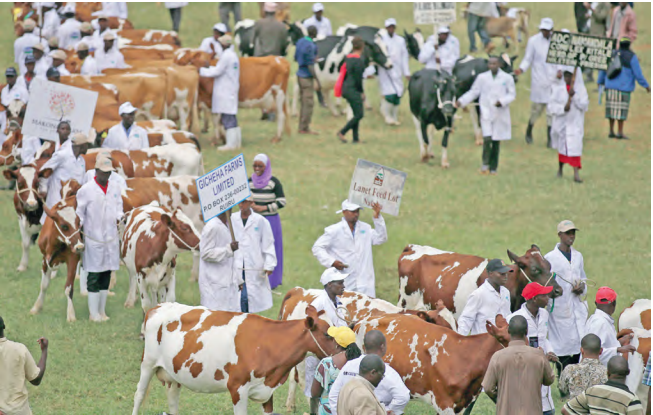(1).png&w=3840&q=100)

The government is advocating the introduction of a new regulatory framework to tackle unethical practices and address growing challenges in the livestock sector.
Dr Christopher Wanga, the director of Livestock Policy Research and Regulations said the proposed legislation will restore order and ensure all actors in the value chain comply with established regulations to foster a more ethical and sustainable industry.
In June this year, the National Assembly published the Livestock Bill, 2024.
The Bill, according to the Ministry of Agriculture, seeks to stimulate the growth of the industry and protect farmers against substandard services offered by fraudsters purporting to be qualified professionals.
Wanga said the bill provides a regulatory framework for previously unregulated livestock sector industries and value chains such as animal feeds, which are essential for livestock-based livelihoods and the national economy.
“Seventy per cent of the livestock population is found in the Asals and it nearly 90 per cent of the population. In the high rainfall areas, the sector provides employment and income mainly through dairy, poultry and pig production,” he said.
“The legislative proposal introduces transformative measures designed to revitalise and provide an enabling environment for the unregulated value chains in the livestock industries in Kenya. This is expected to bring considerable benefits to farmers, livestock keepers, national and county government operations, and the economy.”
Wanga said putting in place a substantive law will usher in order and quality regulation, taming unethical practices that for long have denied value chain proper income.
The Kenya Veterinary Vaccines Production Institute, Kenya Animal Genetics Resource Centres, Kenya Leather Development Council and Kenya Tsetse and Trypanosomiasis Eradication Council are currently in existence under legal notices (subsidiary legislation).
Wanga said through the Livestock Bill, 2024, these institutions will be established under substantive law as Acts of Parliament.
The Kenya Agriculture and Livestock Research Organisation will be reformed to establish the Kenya Livestock Research Organisation.
The Bill also proposes the establishment of the Livestock Inputs and Products Regulatory Authority (LIPRA) and the Livestock and Livestock Products Marketing Board (LLPMB).
LIPRA will regulate the production, manufacture, importation, exportation, distribution and sale of animal feed, as well as genetic resources, livestock inputs, livestock products and undertake capacity building in the livestock sector.
It will also set standards for the delivery of extension services.
LLPMB will advise the national and county governments on matters related to the production and marketing of livestock and livestock products.
It will also promote trade in these products, mobilise market intelligence, support the development and rehabilitation of livestock markets infrastructure, and collect, collate and disseminate data on livestock.
The Association of Kenya Animal Feeds Manufacturers (Akefema) has lauded the bill, saying it will unlock untapped potential and open new opportunities locally and internationally.
Joseph Karuri, Akefema chairman, said the livestock industry lacks sound regulation, allowing quacks to exploit farmers.
Due to the absence of quality control, the industry has suffered from low investment.
“We expect the enactment of the bill after discussion in Parliament will guide in creating an enabling environment, guaranteeing ethical execution of practices and policies,” Karuri said.
He defended the bill, saying it
would not trigger higher business
costs but would provide sound
regulation and protect value chain.












